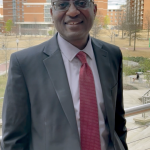Stephen Odaibo, M.D.: The Meaning of Success
By Matt Windsor UAB Magazine Stephen Odaibo grew up in Ilorin, a city roughly four hours north of Lagos. His father is a physician, and Odaibo was set on a career in medicine — if basketball didn’t pan out. He flew to Birmingham in 1998 with his brother David, a year older, to start studying […]


By Matt Windsor
UAB Magazine
Stephen Odaibo grew up in Ilorin, a city roughly four hours north of Lagos. His father is a physician, and Odaibo was set on a career in medicine — if basketball didn’t pan out. He flew to Birmingham in 1998 with his brother David, a year older, to start studying at UAB.
(David Odaibo, Ph.D., earned a B.S. in Electrical Engineering in 2003 and a doctorate in Computer Engineering in 2019 from UAB. David was co-founder and chief technology officer of Birmingham-based Analytical-AI before passing away unexpectedly in his sleep on Sept. 11, 2021).
Stephen Odaibo is married to Lisa, a pediatrician. In 2017, he was selected to receive the Distinguished Alumni Achievement Award from the UAB College of Arts & Sciences, the College’s highest alumni honor.
How did you choose UAB?
“I knew I wanted to come to school in the United States and so did my brother. We just looked in a directory of U.S. schools. We wanted a school that was affordable and nationally recognized for research. And I wanted to do premed, so UAB seemed like a great fit.
“My dad said, ‘Let them go,’ but my mom said, ‘My babies!’ Then the bill showed up, and my dad said, ‘What’s so special about the U.S.?’ But mom said, ‘Let them go,’ so we went.”
You were following in your father’s footsteps as a doctor?
“I wanted to play basketball! My brother and I were on the high school team in Nigeria, we were competitive in the area and the state, and we thought we were pretty good. We went to Bartow Arena and knocked on the coach’s door. We said, ‘We just got off the plane and we would love to play for UAB.’ He gave us a funny look and said, ‘We’ll give you a call.’ That never came. So I quickly decided on medicine.”
But you majored in math through UAB’s fast-track program, which allows students to earn bachelor’s and master’s degrees in as little as four years.
“I knew all along I wanted to do something with math. I love it. The Fast Track Program was really wonderful. I was a TA, got a stipend, had an office and one-on-one mentoring. We were assigned a new faculty member to mentor us each semester. The Friday seminars, the teas — it was great. The professors at UAB were wonderful; I was just on campus in March for an alumni event and most of them are still going strong. I really learned how to think.
“Then at Duke I got a master’s degree in computer science in 2009 and finished medical school in 2010. People said, ‘Why did you switch?’ [from math]. I never switched. I always was seeking to make it work, this combination of math and medicine. And the abstractions and the power of mathematical thinking, in my perspective, can find expression only through a computer.”
Your company, RETINA-AI, uses artificial intelligence for medical diagnoses. Where did that idea come from?
“It was my brother, David, who introduced me to AI in 2012. He told me about deep learning. As an ophthalmologist, I look at pictures of the retina, and those images tell me what I am going to do. He told me about deep learning, that a computer could look at a picture and make the decision that I would make. I started looking into it and my jaw literally dropped. I said, this will completely revolutionize the field of medicine.
“We have built a device that can detect diabetic retinopathy. We started a trial in November 2022 with 1,000 patients. I trained the algorithms inside of our device, which required knowledge of the regulatory piece, the math and the clinical aspect. You wouldn’t really be able to hire someone to do that. With my background, I could.
“It’s been an opportunity to be a leader in the field. In addition to diabetic retinopathy, we believe there are applications for glaucoma, Alzheimer’s, and other systemic diseases that you can detect in the retina.”
What drives you as an entrepreneur?
“The entrepreneurial side is important to me because I want to see solutions that are real, that are reaching patients. It is very hard but very gratifying. I’m the chief technology officer as well as the founder and CEO, so I am forced to keep learning intensely. It’s the intensity of a med student who has an exam coming up, every day. My wife is crucial in all of this. She’s been a really great supporter.”
What is your advice for startup success?
“If it’s the right thing, you just have to stick with it. The first thing is to find out the purpose of what you are trying to do and why. You need that clarity. It can never be, ‘I want to be rich.’ Success from this standpoint is being able to create wealth, not flaunt it. A lot of my clothes are the clothes I was wearing when I was at UAB. My wife and I have one car. To me, being nonmaterialistic has become a kind of superpower. It has allowed me to accumulate capital. It allowed me to make long-term decisions that are investment minded.”
Click one of the links below to read similar stories.
Nigerian-born UAB Alums Connect Through Culture and Community Service
After Selling His Company for $1.2 Billion, Shegun Otulana Builds Better Birmingham







